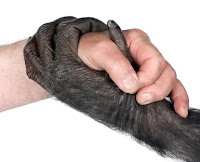No, no, no — that's not what this is all about. The rights I'm talking about have to do with protections. Nonhuman animals, like humans, should be immune from undue confinement, abuse, experimentation, illicit trafficking, and the threat of unnatural death. And I'm inclined to leave it at that for now.
While these animals may not be as intelligent or knowledgeable as humans, their cognitive and emotional capacities are sophisticated enough to warrant special consideration. These are self-aware and self-reflexive animals. They are cognizant of other minds, exhibit deep emotional responses, and have profound social attachments. That's not to be taken lightly.
At the same time I acknowledge that there there has to be a realism applied to this issue. Nonhuman animals who qualify as persons cannot participate in society to the same degree that humans can. Thus, they should be considered and treated in the same manner that we do children and the developmentally disabled—which is that they still have rights! We would never experiment upon a 3-year old human child, nor would we force a mentally disabled person to perform in a circus. We believe this because we recognize that these individuals are endowed with (or have the potential for) the sufficient capacities required for personhood. Consequently, we protect them with laws.
Along similar lines, another objection is that animals who lack a moral understanding of their actions cannot be included in the broader social contract. Again, this argument is unpersuasive. Never minding children and the developmentally disabled, human sociopaths lack a moral understanding of their actions, yet we include them in our charter of rights and freedoms—unless they break the law, in which case they are imprisoned or treated for their disorder. But at no times are they stripped of their fundamental human rights. While imprisoned, sociopaths are no longer allowed to co-mingle with the rest of society, but they can still count on the state to protect them from such things as torture or undue process.
These distinctions are important, particularly if we are to get popular buy-in on this concept. Granting human-level rights is fundamentally about protections; for the time being we shouldn't interpret or extend it beyond that. At the same time however, we need to acknowledge the importance of personhood status. Anything can be protected with the right set of laws. What's crucially important here, however, is understanding the moral weight that personhood status carries. To kill a nonhuman person, for example, should be en par with murdering a human—and with it all the consequences of committing such an act.
So while we can talk of these rights as basic protections, they are also poised to serve as a set of negative rights for humans who have the capacity to morally comprehend their actions and who are capable of participating in the social contract. Simply put, there are just some things you cannot do to persons, human or otherwise.
